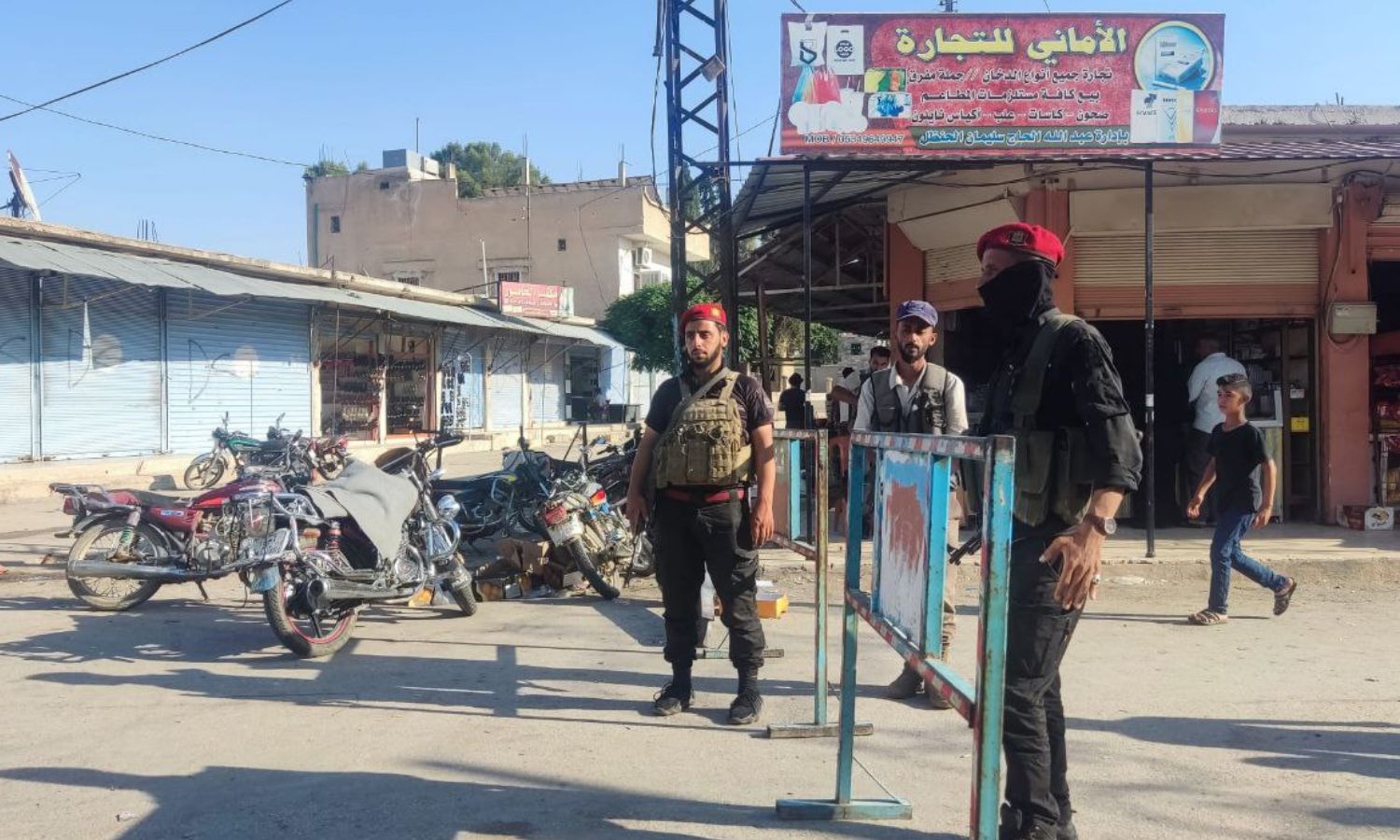



Azaz – Dayan Junpaz
‘Alaa’, a pseudonym used for security reasons, prefers to leave his village of Qatma in the Afrin countryside, north of Aleppo, only when absolutely necessary, after previous incidents of extortion he faced at a military checkpoint.
He told Enab Baladi that he was subjected to extortion and detention for three days at a checkpoint controlled by the Sultan Murad Division in Afrin’s countryside, on accusations of collaborating with the Syrian Democratic Forces (SDF), without any proof, he said.
The division’s elements released the young man, but fears of the incident repeating remain. He added that his friends have tried convincing him to go with them to Afrin or Azaz, but he refuses due to fear of the checkpoints at city entrances, as the detentions are not subject to any legal basis, according to him.
Dozens of military checkpoints are spread across areas controlled by the Syrian National Army (SNA) in the northern and eastern countryside of Aleppo, each affiliated with different factions or formations, ranging from civil police to military police and factions belonging to the National Army.
Some checkpoints are located near military headquarters, and others on main streets to control security and identify cars entering the area, especially after a bombing in Azaz, northern Aleppo on March 31, which killed four civilians and injured five others.
Despite their security purpose, these checkpoints cause tension and fear among the residents in the area, especially the Kurds who are subjected to poor treatment and intentional delays, according to testimonies from Kurdish civilians Enab Baladi met.
Checkpoints are situated at city and town entrances in Afrin, Jindires, Azaz, Mare’, Jarablus, al-Bab, and others.
‘Yahya’ faces constriction and pointless questions, he said, while passing through military checkpoints between his city of Afrin and the neighboring village of al-Basouta on his motorcycle.
He told Enab Baladi that what bothers him the most is the intentional delay and the loud voices of the elements during their interactions, especially if he is with his three children and wife, while he tries to lighten the mood and accommodate the poor disposition of the elements with a smile despite his discomfort.
The variety of questions includes, where are you going? What do you want to do? And when he tells them that he is visiting relatives, he must clarify the names of the people he intends to visit, noting that there are four military checkpoints between Afrin and al-Basouta, and he is stopped at all of them.
Yahya mentioned that he is used to these questions and that he regularly travels to al-Basouta, acknowledging that some elements occasionally treat him kindly.
The young man attributed the reasons for the constriction and the multitude of questions from most of the checkpoint elements he passed through to some elements despising the Kurdish component, therefore treating them with superiority and constriction, basing this on experiences from his Kurdish acquaintances and others.
As for ‘Julia’, a teacher in Afrin city, she told Enab Baladi that Kurdish women are sometimes subjected to numerous questions from the elements, as a woman can be distinguished by her dress.
She spoke about her experience passing through several checkpoints, noting that most elements might be young, or teenagers, and usually have a negative view towards women who do not wear a hijab.
Julia pointed out that Kurdish women might be subjected to searches and scrutiny sometimes while crossing the checkpoints.
In January, elements from the Civil Police stopped an Enab Baladi correspondent on his way to Raju area in Afrin, while going to coordinate with a Kurdish family for filming cooking show episodes, despite identifying himself as a correspondent and media personnel.
After the detention, the correspondent was transferred to Raju police station to complete a few ‘security procedures’, then was released after an hour and apologized to.
The correspondent continued his way to the family, and after finishing his visit and media coverage, the family was questioned over the phone and received summons from the Civil and Military Police to inquire about the reason for the visit.
Turkey, in collaboration with the Syrian National Army, has conducted three military operations inside Syria: “Operation Euphrates Shield” covering areas such as Azaz, Jarablus, al-Bab, Mare’, and al-Rai; “Operation Olive Branch” including Afrin and surrounding areas; and “Operation Peace Spring” in the cities of Tel Abyad and Ras al-Ain.
Turkey maintains 125 military sites in the region, with 57 in the countryside of Aleppo, 51 in Idlib areas, ten in Raqqa, four in al-Hasakah, two in Latakia’s countryside, and one in Hama’s countryside, according to the Jusoor Center for Studies.
The “Operation Olive Branch” resulted in the displacement of over 137,000 people, according to United Nations estimates. Human Rights Watch (HRW) documented the looting and theft of civilian properties in Afrin by the controlling factions.
The Syrian National Army consists of three corps, and there is no fixed number of elements, as the National Coalition for Syrian Revolutionary and Opposition Forces reported their numbers to be 80,000 fighters in 2019. However, a report by the Middle East Institute in October 2022 stated that this force consists of between 50,000 and 70,000 fighters.
Factions within the Syrian National Army are accused of committing violations against civilians. On March 20, 2023, the Newroz crime occurred when two individuals protested the lighting of fires near camps in Jindires, which escalated into gunfire on civilians, killing four members of the Bashmark family and injuring a fifth during the Newroz festival celebrations.
Local witnesses told Enab Baladi at the time that members of a battalion affiliated with the Jaish al-Sharqiyya of the Liberation and Construction Movement in the Syrian National Army had fired on the family members.
if you think the article contain wrong information or you have additional details Send Correction